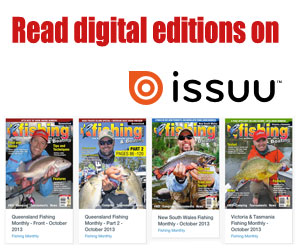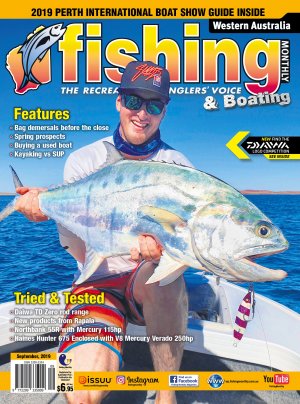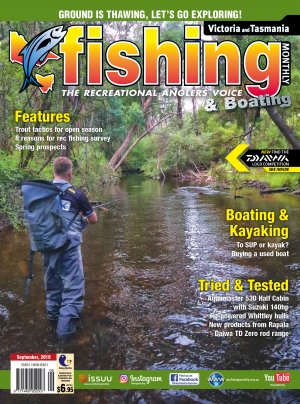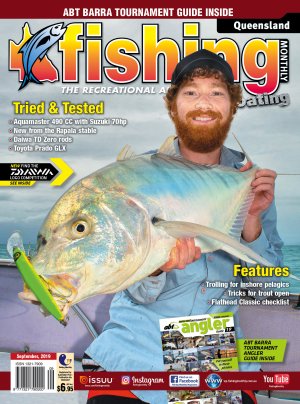In the South East we have had just enough rain to start off the banana prawn run. Over the next few weeks you will see lots of tinnies out in the bay stripped down to just bare flat decks and moving around together as a slow moving cloud following the schools.
Once again the Geelong Star has been banned from fishing by the Australian Fisheries Management Authority.
Following a higher than expected level of albatross mortalities on the Geelong Star’s last fishing trip in the small pelagic fishery, the vessel will not fish again until additional mitigation measures are agreed by Australian Fisheries Management Authority (AFMA) to minimise any further interactions.
AFMA’s acting Chief Executive Officer Dr Nick Rayns said that AFMA would continue to work with the operator, Seafish Tasmania, and seabird experts until the authority was satisfied that the additional measures would be effective. There is currently a senate inquiry into the activities of supertrawlers. It is important that we don’t lose sight of this battle even if this one is currently only fishing in the southern states.
Senate Standing Committee on the Environment and Communication’s Inquiry into the environmental, social and economic impacts of large-capacity fishing vessels commonly known as ‘supertrawlers’ operating in Australia’s marine jurisdiction. In addition to the Australian Recreational Fishing Foundation (ARFF) attached submission we would like to lodge with the Senate Standing Committee on the Environment and Communications some Queensland specific comments.
Queenslanders are intensely protective of what they see as their natural treasures. This was clearly evident with the Queensland based drive to have UNESCO intervene in what appeared to be a death by a thousand cuts of the Great Barrier Reef by wholesale indiscriminate port development along the Queensland coast.
Similarly there has been considerable intense public comment since the beginning of the Commonwealth Marine Reserves review and in particular the Coral Sea Marine Reserves Review. Should large capacity industrial scale vessels (supertrawlers) commence operating off the Queensland coast, most Queenslanders will see it as an attack on their international reputation of unmatched aquatic treasures. We believe the international arena will also believe that this is not a practice that should occur in either the Coral Sea or in the vicinity of the Great Barrier Reef.
Globally, these vessels have destroyed fisheries far more abundant than ours. It seems that decision makers currently believe that doing the same thing the same way will suddenly provide a different outcome. What is of the greatest concern though is that the science needed to clarify the impact of ‘supertrawlers’ is not being investigated and definitive answers on the impacts on multiple interdependent fisheries is not available.
The science around localized depletion has been determined too hard and too expensive. A token definition has been created, but after that not one suggestion of any science or funding to take it further. Until this happens legislators can hold tight to their claims that there is no science to support a belief in the negative impact of ‘supertrawlers’. Once that independent research happens, the reasoning behind the failure of all those overseas fisheries will be more than apparent. Let’s just hope that it’s not too late for Australian fisheries.
The Australian Recreational Fishing Foundation (ARFF) welcomes the opportunity to provide a submission to the Senate Committee Inquiry into the environmental, social and economic impacts of large-capacity fishing vessels commonly known as ‘supertrawlers’ operating in Australia’s marine jurisdiction.
Australia’s recreational fishers are the largest stakeholder/user group affected by fisheries management and environmental management policies and decisions, including commercial fishing activities in the small pelagic fishery (SPF). ARFF is of the view that there is something fundamentally wrong with the way the SPF has been developed and is being managed. Supporting this view is the following:
• The commercial fishing of the SPF has attracted more attention from the Australian community, including recreational fishers, than the commercial activities in any other Australian fishery. This has included a number of rallies and public meetings opposing industrial scale commercial fishing of the SPF.
• The Government has attempted on a number of occasions to facilitate meetings between the vessel operators and ARFF toward achieving a way forward to address the growing concerns of Australia’s recreational fishers. These meetings have been outside the management process for the fishery, as determined under the Fisheries Management Act 1991. This is a clear indication that the existing management process as conducted by AFMA are inadequate to appropriately address the concerns of key stakeholder groups or the broader community about industrial scale commercial fishing of the SPF, particularly when industrial scale fishing activities occur in areas that are valued by other stakeholders or close to population centres.
• The government has invested significant funds to ‘proof’ the science of the fishery. This investment is questioned in relation to the low value of the fishery
• The Senate is holding this inquiry, reflecting concerns, at least within parts of the government, about the process that has lead to the Geelong Star now fishing the SPF.
ARFF remains unconvinced that allowing industrial scale fishing of the small pelagic fishery is the highest and best use of the fishery and in the nation’s interest. ARFF is also concerned over the manner in which this fishery has been managed by AFMA. In particular, it is the view of ARFF that AFMA has taken a narrow focus when assessing the benefits of commercially exploiting a fishery and has not sufficiently addressed its commitments to assess ecologically sustainable development issues, as outlined in the objectives of the Fisheries Management Act 1991. This situation may be resulting in adverse economic, social and environmental impacts on the Australian economy and community.
ARFF recommends that an immediate moratorium be placed on fishing ‘areas of concern’ within the small pelagic fishery (as identified by ARFF) until a comprehensive assessment has been conducted to determine whether industrial scale fishing of the SPF is the highest and best use of the SPF, in our nation’s interest and whether the small pelagic fishery should be commercially fished at all.
Reads: 1304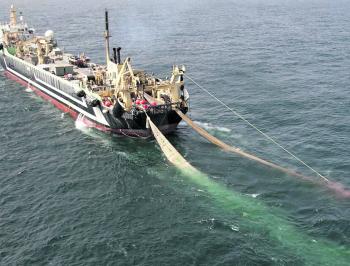
Supertrawlers are currently the focus of huge controversy among fishing groups.

